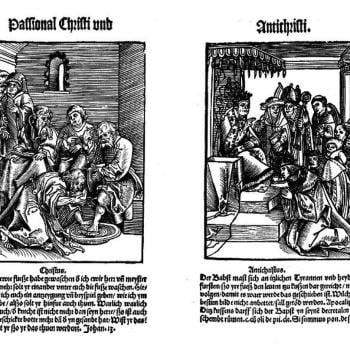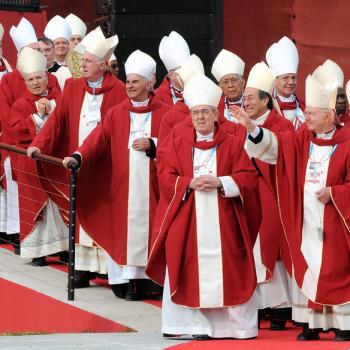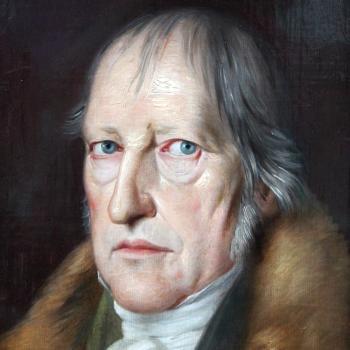Last Spring I blogged about a new play called Wittenberg, which is about three individuals whom history and literature place at the University of Wittenberg: two professors, a Dr. Luther and a Dr. Faustus, and a student, a Danish international student named Hamlet. See A play I have to see and A Reformation Comedy. In the course of our discussions, playwright David Davalos, who wrote the play, weighed in, making me want to see it even more.
Well, I did. The Rep Theater put it on in Columbia, MD, between Baltimore and D.C., so we went with some friends. The play is brilliantly written, extraordinarily learned, and stone cold hilarious. It truly is a comedy of ideas, depicting the conflict between Luther’s Christianity (outraged at the abuses of the medieval church) and Faustus’ philosophical rebelliousness (skeptical of everything except doubt). They are contending for the soul of young Hamlet, who, famously, has trouble making up his mind. Luther and Faustus–who are presented as friends, not as enemies– contending for the souls of each other.
Luther comes out OK. He is a foil for some Christian-mocking, but his conversion to a God of grace and his insights about faith in Christ come out loud and clear. So does his earthy personality and his rhapsodies about the value of beer. And his ideas stand up well against the merry nihilism of Faustus, who, however, comes across even better, at least in this production. Cosmic rebel that he is, Faustus ends up as something of a catalyst for the Reformation, which, yes, does have its rebellious moments. As for Hamlet, Davalos interprets him surprisingly the way I do (which is to say, correctly!) not as a melancholic basket case but as an idealist who comes to trust in God’s providence and His calling.
The play shows us what happens to Luther, showing him at the end making his “Here I stand” confession at Worms. It shows us what happens to Hamlet, showing him making his resigned, confident “the readiness is all” speech. But the play shows us little of what happens to Faustus. He is the philosopher of Goethe’s version, but it doesn’t show his guilt in causing the death of Gretchen (a manifestation of the “Eternal Feminine” that takes several guises in the play, but not this one). He is the professor of Marlowe’s version, but it does little with that unforgettable final scene in Dr. Faustus. OK, there is an allusion to the line about wanting the horses of the night to ride slowly, but nothing about how he sees the sunrise on his last day alive (“Christ’s blood streams in the firmament. . .One drop would save me. . .Half a drop”) and how he bitterly laments his bargain with the devil, which even now he could turn from, but his faith ultimately lurches to Satan instead of to Christ. I could see that the play might not want to give Luther such a clear win, but it could at least show Faustus dreading the moment of his death.
There were lots of academic jokes that I appreciated. Hamlet is a senior who still hasn’t decided what to major in. Dr. Faustus says that he might get excommunicated, tortured, and burned at the stake, but he will not get fired–he has tenure. Some of the jokes over-reached, such as Luther’s reading from the “Song of Solomon” as Faustus and the Eternal Feminine do a lewd shadow show. (What was the purpose of that? Is it funny that the Bible talks about sex? How does this scene line up with the issues of the play?)
The play does a lot with Copernicus’s reconstruction of the Solar system and the existential disorientation it created. Luther favors the old cosmology–which he did–though I wonder if Mr. Davalos knows about that other Wittenberg professor, Rheticus, the devout Lutheran who was the one who actually published and promoted Copernicus’s theories. (He probably interpreted them as this Hamlet finally does, as more of a Christocentric view of the universe, as opposed to the anthropocentric view of classical and medieval humanism.)
Anyway, I don’t mean to complain. Wittenberg was the most satisfying and enjoyable professional theater that I’ve seen in a long time. If it comes to where you live, see it. I hope it makes it to Broadway, gets a Tony, gets made into a movie, gets an Oscar, and on and on. It is far richer, more intelligent, funnier, and spiritually more significant than most of its competitors in today’s theater.














